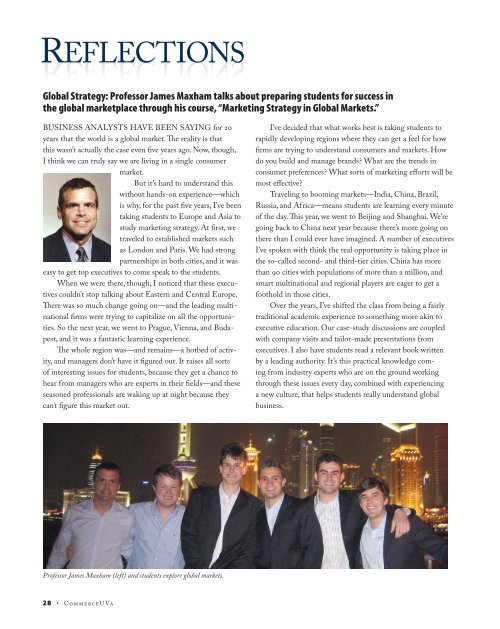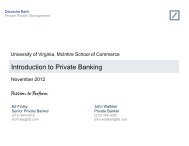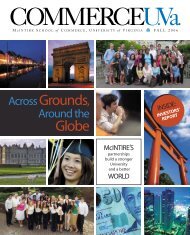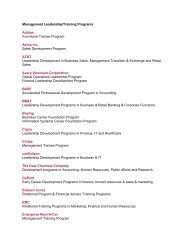CommerceUVA Fall 2007 (Investors' Report) - McIntire School of ...
CommerceUVA Fall 2007 (Investors' Report) - McIntire School of ...
CommerceUVA Fall 2007 (Investors' Report) - McIntire School of ...
You also want an ePaper? Increase the reach of your titles
YUMPU automatically turns print PDFs into web optimized ePapers that Google loves.
ReFLeCTIONS<br />
Global Strategy: Pr<strong>of</strong>essor James Maxham talks about preparing students for success in<br />
the global marketplace through his course, “Marketing Strategy in Global Markets.”<br />
BUSINeSS ANALYSTS hAVe BeeN SAYING for 20<br />
years that the world is a global market. The reality is that<br />
this wasn’t actually the case even five years ago. Now, though,<br />
I think we can truly say we are living in a single consumer<br />
market.<br />
But it’s hard to understand this<br />
without hands-on experience—which<br />
is why, for the past five years, I’ve been<br />
taking students to europe and Asia to<br />
study marketing strategy. At first, we<br />
traveled to established markets such<br />
as London and Paris. We had strong<br />
partnerships in both cities, and it was<br />
easy to get top executives to come speak to the students.<br />
When we were there, though, I noticed that these executives<br />
couldn’t stop talking about eastern and Central europe.<br />
There was so much change going on—and the leading multinational<br />
firms were trying to capitalize on all the opportunities.<br />
So the next year, we went to Prague, Vienna, and Budapest,<br />
and it was a fantastic learning experience.<br />
The whole region was—and remains—a hotbed <strong>of</strong> activity,<br />
and managers don’t have it figured out. It raises all sorts<br />
<strong>of</strong> interesting issues for students, because they get a chance to<br />
hear from managers who are experts in their fields—and these<br />
seasoned pr<strong>of</strong>essionals are waking up at night because they<br />
can’t figure this market out.<br />
Pr<strong>of</strong>essor James Maxham (left) and students explore global markets.<br />
28 • CommerceUVa<br />
I’ve decided that what works best is taking students to<br />
rapidly developing regions where they can get a feel for how<br />
firms are trying to understand consumers and markets. how<br />
do you build and manage brands? What are the trends in<br />
consumer preferences? What sorts <strong>of</strong> marketing efforts will be<br />
most effective?<br />
Traveling to booming markets—India, China, Brazil,<br />
Russia, and Africa—means students are learning every minute<br />
<strong>of</strong> the day. This year, we went to Beijing and Shanghai. We’re<br />
going back to China next year because there’s more going on<br />
there than I could ever have imagined. A number <strong>of</strong> executives<br />
I’ve spoken with think the real opportunity is taking place in<br />
the so-called second- and third-tier cities. China has more<br />
than 90 cities with populations <strong>of</strong> more than a million, and<br />
smart multinational and regional players are eager to get a<br />
foothold in those cities.<br />
Over the years, I’ve shifted the class from being a fairly<br />
traditional academic experience to something more akin to<br />
executive education. Our case-study discussions are coupled<br />
with company visits and tailor-made presentations from<br />
executives. I also have students read a relevant book written<br />
by a leading authority. It’s this practical knowledge coming<br />
from industry experts who are on the ground working<br />
through these issues every day, combined with experiencing<br />
a new culture, that helps students really understand global<br />
business.





